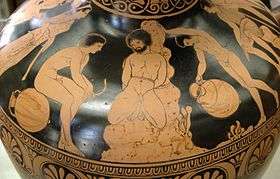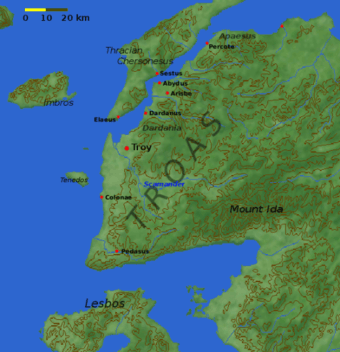Dardanians (Trojan)
The Dardanoi (Greek: Δάρδανοι; its anglicized modern terms being Dardanians or Dardans) in classical writings were either the same people as, or a people closely related to, the Trojans, an ancient people of the Troad, located in northwestern Anatolia. The Dardanoi derived their name from Dardanus, the mythical founder of Dardania, an ancient city in the Troad. Rule of the Troad was divided between Dardania and Troy. Homer makes a clear distinction between the Trojans and the Dardanoi.[1]

Dardanoi and Trojans

The Royal House of Troy was also divided into two branches, that of the Dardanoi, and that of the Trojans (their city being called Troy, or sometimes Ilion/Ilium). The House of the Dardanoi (its members being the Dardanids, Greek: Δαρδανίδαι; Latin: Dardanidae[2]) was older than the House of Troy, but Troy later became more powerful. Aeneas is referred to in Virgil's Aeneid interchangeably as a Dardanian or as a Trojan, but strictly speaking, Aeneas was of the branch of the Dardanoi. Many rulers of Rome claimed descent from Aeneas and the Houses of Troy and Dardania. Homer adds the epithet Dardanid (Δαρδανίδης) to Priam and to other prominent characters denoting that they are members of the house of the Dardanoi.
The Dardanians were led by brave Aeneas, whom the fair Aphrodite, a goddess bedded with a mortal man, bore to Anchises in the mountains of Ida. He was not alone, for with him were the two sons of Antenor, Archilochus and Acamas, both skilled in all the arts of war.
The strait of the Dardanelles was named after the Dardanoi, who lived in the region.
Origins
The ethnic affinities of the Dardanoi, and of the Trojans, and the nature of their language remain a mystery. The remains of their material culture reveal close ties with Luwian,[4] other Anatolian[5] groups, Thracians.[6] The Dardanoi were linked by ancient Greek and Roman writers with a people of the same name who lived in the Balkans (i.e. the Dardani), a notion supported by a number of parallel ethnic names found both in the Balkans and Anatolia that are considered too great to be a mere coincidence (e.g. Eneti and Enetoi, Bryges and Phryges, Moesians and Mysians).[7][8] Archaeological finds from the Troad dating back to the Chalcolithic period show striking affinity to archaeological finds known from the same era in Muntenia and Moldavia, and there are other traces which suggest close ties between the Troad and the Carpatho-Balkan region of Europe. Archaeologists in fact have stated that the styles of certain ceramic objects and bone figurines show that these objects were brought into the Troad by Carpatho-Danubian colonists; for example, certain ceramic objects have been shown to have Cucuteni origins.[9]
Variations of the name
Words used by Homer are:
- Dardaniōnes,[10] Δαρδανίωνες denotes Trojans in general
- Dardanioi, Δαρδάνιοι, same as above
- Dardanidai, Δαρδανίδαι, descendants of Dardanus; in Latin sometimes also used for Trojan women[11] in the Aeneid
- Dardanoi, Δάρδανοι, descendants of Dardanus, but also Trojan descendants of Assarakos[10]
References
- "Review: Some Recent Works on Ancient Syria and the Sea People", Michael C. Astour, Journal of the American Oriental Society, Vol. 92, No. 3, (Jul. - Sep., 1972), pp. 447–459 writing about Richard David Barnett who identified the Dardanoi with the Trojans: "Which is,incidentally, not so: the Iliad carefully distinguishes the Dardanoi from the Trojans, not only in the list of Trojan allies (11:816–823) but also in the frequently repeated formula keklyte meu, Trôes kai Dardanoi ed' epikuroi (e.g., III:456)".
- Vergil: Aeneid 10, Tome 10.
- Hom. Il. 2,819-823. (Translated by Terence Chan)
- Trojans and Their Neighbours: An Introduction (Ancient Peoples) by T. Bryce, 2005, p. 117: "... question, we might have a clearer indication of the Trojans' ethnic origins. We have referred to the widespread distribution of Luwian- ..."
- Art of the First Cities: The Third Millennium B.C. from the Mediterranean to the Indus (Metropolitan Museum of Art Series) by Joan Aruz, 2003, p. 255, "... and the type and technology of the alloy are of Anatolian, and specifically Trojan, origin. ..."
- The National Encyclopædia: A Dictionary of Universal Knowledge: By Writers of Eminence in Literature, Science, and Art. Volume 14 : Tri - Z by unknown author, 2001, p. 22: "... his allies. The inhabitants of the Troad were probably of Thracian origin. At the time of the Trojan War they had reached a higher state of prosperity and ..."
- Wilkes, John (1992). The Illyrians. Wiley. p. 145. ISBN 9780631146711.CS1 maint: ref=harv (link)
- J. B. Bury; S. A. Cook; F. E. Adcock, eds. (1931). The Cambridge Ancient History: The Egyptian and the Hittite Empires. 2, Part 2 (1st ed.). Cambridge University Press. p. 17.
- Hoddinott, Ralph F., The Thracians, Thomas & Hudson Inc., 1981. pp. 35–38
- Iliad, 7.414, 8.154. See The Iliad: a commentary, page 286.
- Lemprière's Classical dictionary.